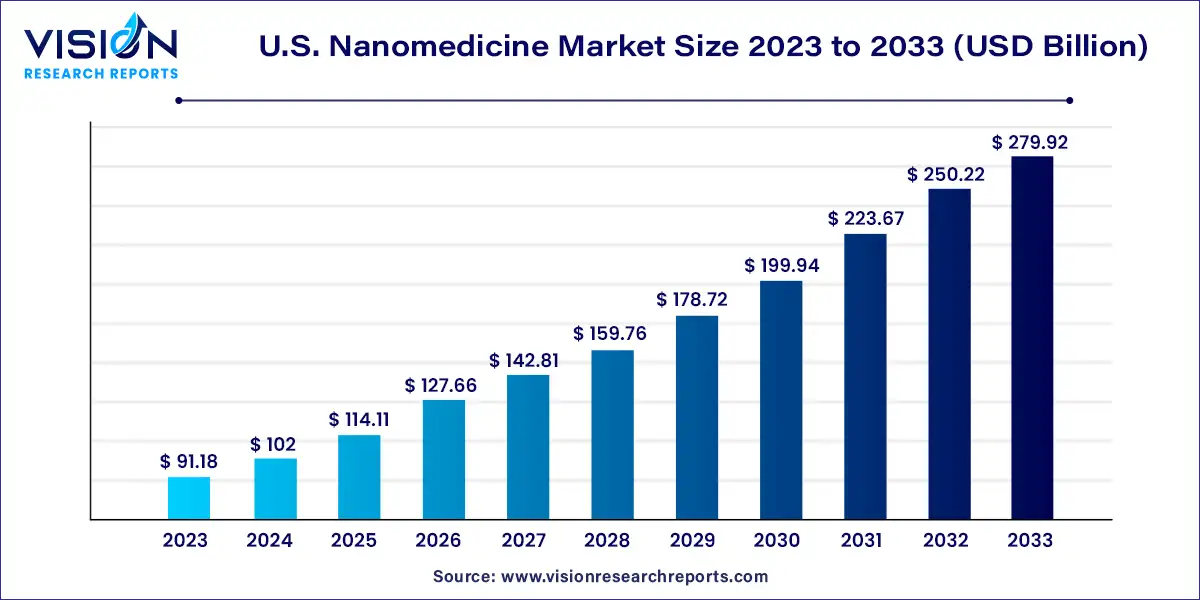The U.S. nanomedicine market size was estimated at around USD 91.18 billion in 2023 and it is projected to hit around USD 279.92 billion by 2033, growing at a CAGR of 11.87% from 2024 to 2033.

The U.S. nanomedicine market is at the forefront of a revolutionary shift in healthcare, leveraging the unique properties of nanotechnology to advance medical diagnostics, treatment, and drug delivery. As a rapidly evolving field, nanomedicine promises to enhance the efficacy and precision of therapeutic interventions, offering significant improvements in patient outcomes.
The growth of the U.S. nanomedicine market is propelled by an increasing prevalence of chronic diseases, such as cancer and cardiovascular conditions, drives the demand for more effective and targeted therapies that nanomedicine can provide. Additionally, significant investment in research and development by both governmental and private sectors fosters innovation and the development of advanced nanotechnological solutions. Advances in drug delivery systems, which enhance the efficacy and precision of therapeutics while minimizing side effects, further contribute to market expansion. Moreover, the growing adoption of nanotechnology in diagnostics for early and accurate disease detection bolsters market growth. Finally, favorable regulatory frameworks and the rising trend of personalized medicine also play crucial roles in driving the expansion of the nanomedicine market in the United States.
The drug delivery segment led the market with a 35% share in 2023. The increasing use of metal-based nanoparticles in biomedical applications is expected to fuel market growth. Additionally, the rising interest in vivo-specific targeting using gold-based drug delivery for larger conjugate sizes is projected to boost demand in this segment. Ongoing research into drug delivery applications that utilize gold and other metal and metal oxide nanoparticles, along with their inherent photothermal therapy capabilities, is anticipated to drive rapid growth in this sector.
The therapeutics segment is projected to experience the highest growth over the forecast period. Advances in nanotherapeutics, particularly those related to overcoming biological barriers, are expected to propel market expansion. Nanotherapeutics offer multiple benefits that can help address current gaps in therapeutic options. Blood disorders, diabetes, cancer, and neurodegenerative diseases are some areas likely to benefit significantly from nano-based drug delivery systems.
The clinical oncology segment dominated the market with a 34% share in 2023, primarily due to cancer being a leading cause of mortality and morbidity. The demand for more targeted cancer therapies is a significant factor driving R&D in clinical oncology. Nanomedicine is rapidly emerging as an effective treatment modality due to its high targeting efficiency and reduced adverse effects in cancer treatment. Research in Cancer Nanotechnology (IRCN) is also anticipated to further boost the growth of this segment.
The infectious disease segment is projected to experience substantial growth over the forecast period. The use of nanoparticle-based therapies for targeting non-cancer conditions, such as infectious diseases, has increased in recent years. Ongoing R&D aimed at developing solutions to address the rising burden of infectious diseases is another crucial factor expected to drive the growth of the nanomedicine market in this segment.
The nanoparticles segment dominated the market with a 77% share in 2023. This dominance is attributed to ongoing advancements in targeted nanoparticle drug delivery for treating melanoma. Additionally, numerous research projects are exploring the use of nanoparticles in homeopathy, which is expected to drive the segment's growth in the coming years.
The nanoparticles segment is anticipated to register significant CAGR over the forecast period. Nanoparticles offer several advantages over traditional molecular imaging probes. Nanotubes are utilized in designing strategies for delivering genes, molecular probes, and pharmaceuticals into cells. They also play a crucial role in stem cell therapies and assist in tissue regeneration. Carbon nanotubes, in particular, have garnered significant attention as carriers of biologically relevant molecules due to their unique chemical, physical, and physiological properties.
By Application
By Indication Scope
By Molecule Type
 Cross-segment Market Size and Analysis for
Mentioned Segments
Cross-segment Market Size and Analysis for
Mentioned Segments
 Additional Company Profiles (Upto 5 With No Cost)
Additional Company Profiles (Upto 5 With No Cost)
 Additional Countries (Apart From Mentioned Countries)
Additional Countries (Apart From Mentioned Countries)
 Country/Region-specific Report
Country/Region-specific Report
 Go To Market Strategy
Go To Market Strategy
 Region Specific Market Dynamics
Region Specific Market Dynamics Region Level Market Share
Region Level Market Share Import Export Analysis
Import Export Analysis Production Analysis
Production Analysis Others
Others